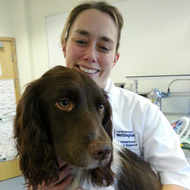
Debate considers changing responsibilities and roles within the veterinary profession
Dr LIz Mossop, subdean for teaching and learning at the University of Nottingham, and Tom Mowlem, practice director Vets4Pets, led the debate 'Is professionalism dead' on Friday (20 November) at BVA Congress.
Tom began the debate by talking about the effect of corporate practice on veterinary professionalism - suggesting that corporates are often seen as a threat to the role of the vet in society, but all businesses need to make money and corporates have simply formalised that process.
He suggested that the impact of the corporate on professionalism had some very positive effects on the veterinary professional such as uniform, standards audits, CPD and training.
He also talked about the financial and non-financial methods used by corporates to incentivise vets, pointing out the schemes that should be avoided - namely individual turnover related to pay, targeting sales on individual profits, and setting quotes for the number of procedures to 'sell'.
Liz Mossop then looked at professionalism from the educator's point of view. She outlined the ways in which her vet school helps students at all stages of their training to be mindful of what professionalism is and to reflect on issues and situations that have a bearing on their professionalism.
Professionalism is 'taught' in a number of different areas in the professional skills modules as well as being part of the in care curriculum, but it is also experienced during the students EMS and by observation of role models both within the veterinary schools and in practice.
When the session was opened for debate, the first question was whether or not the age of the client affected their attitude to what is professional in a veterinary surgeon. It was also suggested that new graduates spend far too much time in practice worrying about being professional, when in fact there is a bedrock of professional empathy and understanding in all veterinary practices supporting the professional service that clients receive.
The panel agreed that new graduates should not be spending time worrying about this and, rather than agonising over how professional they are, they should just be getting on with the job and developing their skills.
Tom made the point that it was really important for vets not to over analyse how they were behaving and how professional they were being. There seemed to be a general feeling in the room that many new graduates have unreasonable expectations of themselves and that the move towards specialisation has led many vets to feel that to be a general practitioner is no longer enough or professional enough.
They see specialists all around them and think that this is what they have to aspire to in their professional career. The feeling of a need to specialise adds a greater burden to the shoulders of a new graduate, whereas perhaps it is the general practitioner who should be seen as the real professional.
Progression, said the panel,does not have to be specialisation and maybe some of the burn-outs seen are due to this self made pressure.|
The question was also asked whether teaching more business skills to students added to the pressure once they were in practice, as they felt under pressure to deliver financially as well as clinically.
An interesting comment came from a vet who had graduated three years ago. She suggested that in the UK, clients no longer always trusted the younger vet but that in Switzerland, where she now worked, this was not the case and vets of all ages were trusted and respected for their professionalism and abilities.
A final suggestion for professionalism came at the end of the debate: professionalism, said one member of the audience, as apposed to pure technical abilities brings brings wisdom, ethics and humanity to what we do.



 The veterinary mental health charity Vetlife is inviting the veterinary community to join it for a sponsored cold-water dip.
The veterinary mental health charity Vetlife is inviting the veterinary community to join it for a sponsored cold-water dip.